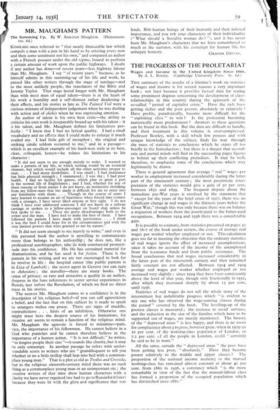MR. MAUGHAM'S PATTERN
KINGLAKE once referred to " that nearly iinmatable law which compels a man viith a pen in his hand to be uttering every now and then some sentiment not his own," and compared an author with a French peasant under the old regime, bound to perform a certain amount of work upon the public highways. I doubt if any author has done—of recent years—less highway labour
than Mr. Maugham. I say " of recent years " because, as he himself admits in this summing-up of his life and work, he passed like other writers through the stage of tutelage—and to the most unlikely people, the translators of the Bible and Jeremy Taylor. That stage lasted longer with Mr. Maugham than with most men of equal talent—there is at the heart of his work a humility and a self-distrust rather deadening in
their effects, and his stories as late as The Painted Veil were a curious mixture of independent judgement when he was dealing with action and of clichés when he was expressing emotion.
An author of talent is his own best critic—the ability to criticise his own work is inseparably bound up with his talent : it is his talent, and Mr. Maugham defines his limitations per- fectly : " I knew that I had no lyrical quality. I had a small
vocabulary and no efforts that I could make to enlarge it much availed me. I had little gift of metaphor ; the original and striking simile seldom occurred to me," and in a passage— which is an excellent example of his hard-won style at its best, clear, colloquial, honest—he relates his limitations to his character :
" It did not seem to me enough merely to write. I wanted to make a pattern of my life, in which writing would be an essential element, but which would include all the other activities proper to man. . . . I had many disabilities. I was small ; I had endurance but little physical strength ; I stammered ; I was shy ; I had poor health. I had no facility for games, which play so great a part in the normal life of Englishmen ; and I had, whether for any of these reasons or from nature I do not know, an instinctive shrinking from my fellow-men that has made it difficult for me to enter into any familiarity with them. . . . Though in the course of years I have learned to assume an air of heartiness when forced into contact with a stranger, I have never liked anyone at first sight. I do not think I have ever addressed someone I did not know in a railway carriage or spoken to a fellow-passenger on board ship unless he first spoke to me. . . . These are grave disadvantages both to the writer and the man. I have had to make the best of them. I have followed the pattern I have made with persistence. . . . I think it was the best I could hope for in the circumstances and with the very limited powers that were granted to me by nature."
" It did not seem enough to me merely to write," and even in this personal, book the author is unwilling to communicate more than belongs to his authorship ; ' he does not, like a professional autobiographer, take 'its -with commercial prompti- tude into his confidence. His life has contained material for dramatisation,' and he has used it for fiction. There is the pattern in his writing and we are not encouraged to look for its reverse in life : the hospital career (the public pattern is in Liza of Lambeth) ; the secret agent in Geneva (we can turn to Asherzden); the traveller—there are many books. The sense of privacy, so rare and attractive a quality in an author, deepens in the bare references to secret service experiences in Russia, just before the Revolution, of which we find no direct
trace in his stories.
The nearest Mr. Maugham comes to a confidence is in the description of his religious belief—if you can call agnosticism a belief, and the fact that on this subject he is ready to speak to strangers makes one pause. There are signs of muddle, contradictions . . . hints of an inhibition. Otherwise one might trace here the deepest source of his limitations, for creative art seems to remain a function of the religious mind. Mr. Maugham the agnostic is forced to minimise—pain, vice, the importance of his fellowmen. He cannot believe in a God who punishes and he cannot therefore believe in the importance of a human action. " It is not difficult," he writes, "to forgive people their sins "—it sounds like charity, but it may be only contempt. In another passage he refers with under- standable scorn to writers who are " grandiloquent to tell you
whether or no a little trollop shall hop into bed with a common- place young man." That is a plot as old as Troilus and Cressida,
but to the religious sixteenth-century mind there was no such thing as a commonplace young man or an unimportant sin ; the creative writers of that• time drew human characters with a clarity we have never regained (we had to go to Russia for it later) because they were lit with the glare and significance that war lends. Rbb human beings of their heavenly and their infernal importance, and you rob your characters of their individuality (" What should a Socialist woman do ? "), and it has never been Mr. Maugham's characters that we have remembered so much as the narrator, with his contempt for human life, his unhappy honesty.
GRAHAM GREENE.






































 Previous page
Previous page